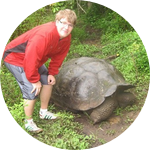Project Results
The manuscript can be found here: https://www.ecoflicklab.com/publications/
About This Project
Ask the Scientists
Join The DiscussionWhat is the context of this research?
Research Goals:
1) Understand the non-consumptive effects of a predator on pathogens of soybean loopers.
2) Make the results accessible to farmers, agricultural centers, and the public.
3) Use the results to help improve Integrated Pest Management (IPM) programs and expand environmentally-friendly agriculture practices.
What is the significance of this project?
With increasing use of soy products there is a need to find environmentally sustainable ways to maintain crop yield. It is becoming apparent that chemical pesticides need to be reduced for a more environmentally safe alternative. To this end we are working to elucidate the effects of predators on the disease transmission of crop pests. By learning more about the interactions of crop pests with their natural enemies and pathogens, IPM programs can be improved and more successfully implemented. Previous attempts at applying biological control agents have had unforeseen consequences, so careful preparation and understanding of these agents and their interactions in the environment is of critical importance. We are ready to expand the body of research available to farmers, agricultural centers, and the general public to help decrease pest damage. By using the right predators in combination with the right pathogens we can effectively control crop pests without having to use chemical pesticides.
What are the goals of the project?
The funds will be used to purchase necessary products and construct our experimental design. We need 1750 plastic cups (1-oz and 2-oz) and lids to hold larval soybean loopers and spined soldier bugs. We will also purchase food to rear the juvenile insects on (Southland Products Inc.) as well as a soil mix containing vermiculite, soil, and osmocote to grow the soybeans.
Budget
The budget is used to cover expenses associated with rearing insects.
Meet the Team
Affiliates
Team Bio
I grew up in suburban Wisconsin in a house surrounded by woods, ponds, and marshes. It was here that I learned to enjoy nature, and wanted to work to help conserve it as much as possible. I volunteered at the Wildlife in Need Center down the road while I was in high school. In college I volunteered at the Raptor Center in St. Paul, Minnesota. Now, as a graduate student, I am working to discover new ways to break our dependency on chemical pesticides.Andrew Flick
I grew up in suburban Wisconsin in a house surrounded by woods, ponds, and marshes. It was here that I learned to enjoy nature, and wanted to work to help conserve it as much as possible. I volunteered at the Wildlife in Need Center down the road while I was in high school. In college I volunteered at the Raptor Center in St. Paul, Minnesota. Now, as a graduate student, I am working to discover new ways to break our dependency on chemical pesticides.
Project Backers
- 11Backers
- 100%Funded
- $550Total Donations
- $50.00Average Donation
